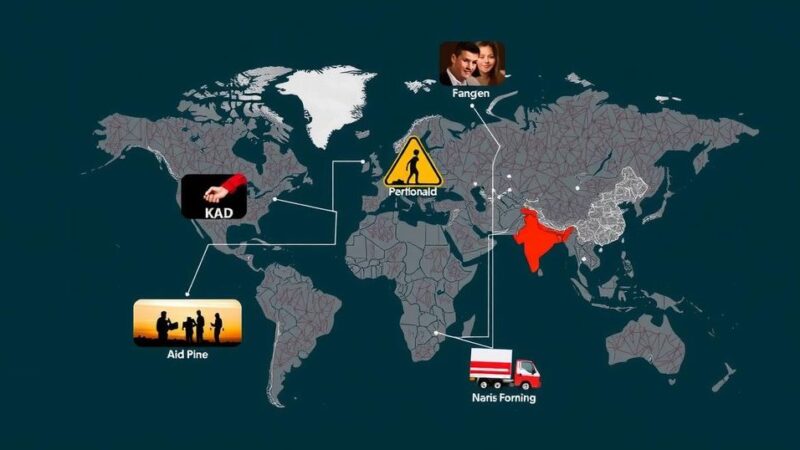A recent study by Freedom House indicates a 14-year decline in global internet freedom, with Myanmar and China ranked as the worst offenders. Kyrgyzstan experienced the most significant drop due to government crackdowns on online dissent. The report highlights severe restrictions in various countries while noting Iceland as the most free for internet use. In total, 27 out of 72 countries evaluated suffered diminished protections for online rights, compelling a reassessment of governmental practices affecting digital freedoms, especially in light of upcoming elections in multiple nations.
A recent report published by Freedom House, a prominent pro-democracy research organization based in the United States, reveals a distressing decline in global internet freedom, marking the 14th consecutive year of such deterioration. According to the report, Myanmar and China share the dubious distinction of having the worst environment for internet freedom in the world. Notably, the report indicates that Kyrgyzstan experienced the steepest decline in internet freedoms, attributed to President Sadyr Japarov’s crackdown on digital organizing and media suppression. The national authorities in Kyrgyzstan shut down the investigative media site, Kloop, following allegations of torture made by an opposition leader. The Freedom on the Net (FOTN) report illustrates a significant regression in online human rights protections for users in 27 out of the 72 assessed countries. Myanmar, under its military governance, has intensified its repression of dissent through systematic censorship and extensive surveillance of online activities. This was further compounded by the May 2024 measures that prohibited access to virtual private networks (VPNs), which are commonly utilized to circumvent governmental internet controls. In China, the pervasive restrictions on internet freedoms stem from the so-called “Great Firewall,” a mechanism designed to isolate the nation from global internet resources and to suppress content perceived as a threat to the ruling Communist Party. In response to questions regarding the report, a spokeswoman for China’s Ministry of Foreign Affairs, Mao Ning, refuted its credibility, insisting that citizens enjoy various rights and freedoms legally. The report also draws attention to additional countries experiencing censorship challenges, such as Azerbaijan—set to host the upcoming United Nations climate summit—where individuals have been imprisoned for social media expressions, and Iraq, which remains embroiled in violence against activists following social media-driven protests. Alarmingly, in three-quarters of the surveyed countries, individuals faced arrests for nonviolent expressions, occasionally resulting in excessive prison terms exceeding a decade. Conversely, Iceland continues to uphold its position as the nation with the most unrestricted online environment, followed closely by Estonia, Canada, Chile, and Costa Rica. In addition, Zambia has witnessed notable improvements in its internet freedom, reflecting an expanding space for online activism. For the first time, the FOTN report also evaluated conditions in Chile and the Netherlands, both of which demonstrated robust protections for digital human rights. In addressing the situation in the United States, the report raised concerns over insufficient safeguards against governmental surveillance, marking a score of 76 out of 100 in terms of protections against online rights violations. The report specifically highlighted actions by at least 19 states regarding the regulation of artificial intelligence in electoral campaigns, emphasizing the impact of internet censorship on electoral processes. As a result, over a billion voters faced significant decisions amidst a heavily manipulated and unreliable informational landscape, particularly in anticipation of the forthcoming November 5 presidential election.
The context of this report illustrates a worrying trend of declining internet freedoms worldwide, characterized by increased censorship, governmental surveillance, and repression of digital media. Freedom House’s annual report is a critical resource that monitors such developments globally, assessing how different nations uphold human rights and freedoms in the digital sphere. As the landscape of global internet access evolves, it reflects broader political contexts, particularly in regions plagued by authoritarian regimes or repressive governance. The 2024 findings notably highlight the shrinking spaces for public discourse, activism, and informational transparency, catalyzed by state-sponsored censorship efforts. Countries such as Myanmar and China exemplify the extreme consequences of such repression, underscoring the urgency to advocate for fundamental digital rights. The report also indicates emerging democratic practices in some regions, alongside the oppressive measures observed in others.
In conclusion, the 2024 Freedom on the Net report underscores a troubling decline in global internet freedom, with Myanmar and China underlining the extreme suppression of online liberties. The observable deterioration of rights, particularly in Kyrgyzstan and other nations, serves as a stark reminder of the continuing struggles faced by activists and ordinary citizens in their pursuit for freedom of expression. Conversely, nations like Iceland and Zambia highlight the contrasting potential for advancing online rights and freedoms. The report calls for an urgent examination of government policies that threaten the integrity of digital spaces, asserting the ongoing need for international vigilance and advocacy in defending human rights online.
Original Source: www.aljazeera.com






